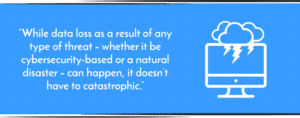 We don’t mean to alarm you but…
We don’t mean to alarm you but…
The bad news is statistically, you’re likely to suffer a cybersecurity attack at some point in your business’s lifetime. The good news is that there are ample ways to protect your business from losing critical business data should such an event happen.
The past year has also seen significant growth in the number of business email compromise (BEC) scams. Over 400 businesses are targeted by a BEC attack, each day. Also referred to as CEO fraud or “whaling,” a BEC scam is a form of spear phishing attack where an attacker impersonates a company executive (often the CEO) and attempts to get an employee, customer, or vendor to transfer funds or sensitive information.
According to the FBI, there is no way to know if you could be a potential target. “The victims of the BEC scam range from small businesses to large corporations. The victims continue to deal in a wide variety of goods and services, indicating that no specific sector is targeted more than another.” It’s estimated that these business email attacks cost companies over $5 billion between October 2013 and December 2016.
One of the largest growing targets for companies dealing with BEC threats is during tax season. According to Tamara Powell, acting director of the IRS Return Integrity Compliance Services, “In the first four months of 2017, 870 organizations reported to the IRS that they received a W-2 phishing email, up from about 100 organizations in the first four months of 2016.”
Why doing it “the way we’ve always done it” could be a problem
Let’s get back to the good news. While data loss as a result of any type of threat- whether it be cybersecurity based or a natural disaster- can happen, it doesn’t have to catastrophic. Threats to your business may have advanced, but so has the technology to backup and restore your information.
Planning for business continuity through data backup also doesn’t have to be overly complicated. You’ll want to answer the following questions when deciding how to create your backup plan:
- What information needs to be backed up?
- Where should I back up my information?
- How do I retrieve my information when I need it?
- How is my information kept safe?
Answering these critical questions will help direct your search for a data backup and recovery plan to fit your business’ individual needs.
The benefits of a backup and recovery plan
When you choose to create a data backup and recovery plan, you’re giving yourself the opportunity to focus on your business and leave the stress of data loss behind. Without this type of preparation, any unexpected event can severely disrupt the operation, continuity, and effectiveness of your business. According to Disaster Recovery International, detailed disaster recovery plans can prevent many of the heartaches and headaches experienced by an organization in times of disaster.
By having practiced plans, not only for equipment and network recovery but also plans that precisely outline what steps each person involved in recovery efforts should undertake, an organization can improve their recovery time and minimize the time that their normal business functions are disrupted.
Protect tomorrow’s livelihood today
While no one wants to believe their business could be the target of an attack or suffer loss from a natural disaster, we’ve shown that the statistical likelihood of it happening is strong. This news doesn’t need to worry you, however, if you have a plan of protection.
Choose to work with a backup and recovery provider with experience providing businesses like yourself the confidence that you’re always covered. Call Axxys today.










